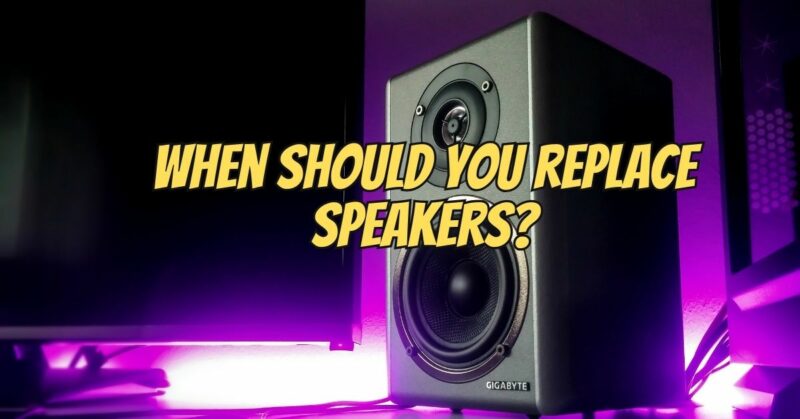Knowing when to replace speakers can depend on several factors, including their condition, performance, and your personal preferences. Here are some signs and considerations to help you determine when it may be time to replace your speakers:
- Deterioration in Sound Quality:
- If you notice a significant decline in sound quality, such as distorted audio, buzzing, or muffled sound, it may indicate that the speakers are no longer performing as they should. These issues can be caused by worn-out components or damage.
- Visible Damage:
- Physical damage to the speakers, such as torn surrounds, damaged cones, or rust on metal components, can impact their performance. If the damage is severe and affects the sound, it may be time to replace them.
- Age of the Speakers:
- Speakers, like any mechanical components, have a finite lifespan. The age of the speakers can be a factor in their deterioration. If your speakers are very old and show signs of wear, it might be worth considering an upgrade.
- Incompatibility or Limited Features:
- If your speakers are no longer compatible with your audio equipment or lack features you desire (e.g., connectivity options, modern sound processing), you may want to replace them with speakers that better suit your needs.
- Uneven or Imbalanced Sound:
- If you’re experiencing uneven volume levels or imbalanced sound between speakers in a multi-speaker setup, it could indicate issues with one or more speakers. Replacing the affected speakers may restore balance.
- Upgrading Your Audio System:
- When you decide to upgrade other components of your audio system, such as the amplifier or source equipment, it may be a good time to consider upgrading the speakers as well. This ensures that all components work well together.
- Personal Preference:
- Your personal preferences for sound quality and aesthetics may change over time. If you desire a different sound signature or a more modern appearance, you may opt to replace your speakers to align with your tastes.
- Repair Costs:
- Consider the cost of repairs or refurbishment. If the cost of fixing damaged or deteriorated speakers is close to or exceeds the cost of new speakers with similar or improved performance, it may be more economical to replace them.
- Listening Experience:
- Ultimately, your listening experience and satisfaction with your speakers are important factors. If you find that you’re no longer enjoying your audio setup due to speaker-related issues, it may be a strong reason to explore new speakers.
Before deciding to replace your speakers, it’s a good idea to consult with a professional audio technician or visit an audio showroom to audition different speaker models. This allows you to assess the performance, sound quality, and features of potential replacements and choose speakers that best meet your current needs and preferences.


